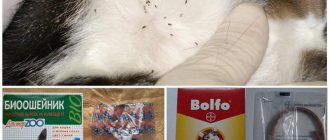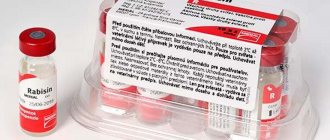Rabies is a serious disease that affects the nervous system and most often ends in death. Transmitted through bites with saliva. Four-legged pets are also susceptible to this disease. Its danger lies in the fact that an infected individual spreads the disease 10 days before the first signs of the disease appear. Rabies vaccination for cats has become a vital procedure.
An antidote for this terrible disease has not yet been found. Therefore, all infected animals are destroyed. To prevent the cat from becoming ill and to please its owners, it is advisable not to ignore vaccinations.
Vaccination to protect against severe diseases
In the city, cats are exposed to harmful bacteria every day. When they enter the body of four-legged pets, they cause various diseases.
When an animal is in poor health, death is possible.
To avoid an unfavorable turn of events, cats are vaccinated. Vaccination protects against many dangerous diseases, including rabies. Many owners mistakenly reason that if their pet does not leave the house to go outside, then vaccination is not needed.
However, this is not true; the cat can catch the infection:
- if he runs away;
- when coming into contact with other cats or dogs;
- Mice or rats, carriers of infection, may enter the room;
- the virus is brought indoors with soil on the soles of shoes.
It is advisable to vaccinate annually. The veterinarian issues a certificate of vaccinations performed.
In addition to protecting the animal from diseases, the vaccine is needed for:
- Human safety: a terrible disease is transmitted not only to animals, but also to people.
- Admission of cats to various exhibitions: document on vaccinations is provided 15 days before the event.
- Mating of animals: the presence of all vaccinations in a cat is a necessary condition for the birth of healthy offspring. Kittens will be protected by drugs for another 2 months after birth.
- Travel: When purchasing long-distance tickets, a vaccination certificate for your quadruple friend is required.
- If there are cases of rabies in the area where the pet lives.
Antibodies are produced within 4 weeks after vaccination. Vaccination must be done in advance.
Also read the article about cat rabies.
What should you pay attention to after vaccination?
You cannot leave the clinic for 20 minutes after receiving a rabies vaccination. Very rarely, but animals, especially those prone to allergies, may develop anaphylactic shock. In order to take all measures in time, a specialist must be nearby.
When an absolutely healthy animal is vaccinated, no complications usually arise. The maximum that awaits the pet is a depressed state, which manifests itself through lethargy, drowsiness and lack of appetite. It can last for 2-3 days, after which everything returns to normal. Sometimes there may be swelling at the injection site. Without the intervention of a veterinarian, it goes away within two weeks.
There is no need to worry if the redness and swelling are minor, but if rashes appear on other areas of the skin, and the cat begins to intensively scratch the injection site, then you should immediately consult a doctor. Also a signal of emergency contact with a specialist - vomiting, diarrhea, fever.
Vaccination schedule: who draws it up and is responsible for vaccinations
The kitten receives its first vaccination (against several diseases at once) 3 months after birth. There is no point in carrying it out earlier, because... Newborns receive antibodies from their mother's milk. A month later, a revaccination procedure is carried out, and along with it an injection against rabies is given.
The next vaccination is recommended at 1 year of age.
The International Veterinary Association recommends rabies vaccination every twelve months.
There are different types of vaccinations for cats: mandatory and those that are optional. Their schedule is drawn up by a veterinarian. A rabies injection is considered a mandatory procedure. Whether vaccination against other diseases is necessary is decided only by the person who has taken responsibility for the fate of the mustachioed pet. The vaccination note is placed in the cat’s passport.
Vaccination of cats against rabies
Rabies is transmitted by contact with the saliva of a sick animal through a bite, as well as through wounds and scratches.
The virus can penetrate through a small injury on the skin or mucous membranes, and the closer to the head the infection occurs, the faster the disease develops. The reason lies in the fact that the rabies virus destroys nerve cells in the brain, spreading along neural pathways. Specific inflammation of the brain leads to the appearance of signs of rabies: drooling, hydrophobia, photophobia and hallucinations. Cats, like other carnivores, can become infected with rabies from an infected animal and pass the disease on to their owners. It is precisely because of the high danger to humans that rabies is a quarantine disease, immunization against which is mandatory for all cats and dogs. Prevention of rabies is carried out annually, and the animal can be vaccinated with the rabies vaccine or the monovaccine “NOBIVAK R”, “RABIZIN” or complex drugs in combination with the viruses “NOBIVAK TRICAT Trio”, “KVADRICAT”.
Proper preparation of a cat for vaccination
Before vaccination, you need to make sure that your four-legged pet does not have fleas and worms.
If in doubt, a couple of weeks before vaccination you should:
- Get rid of external parasites. Fleas and ticks are removed using special sprays and shampoos.
- The animal must be dewormed. For greater effectiveness, taking the medication can be repeated after 14 days.
- In parallel with the treatment, probiotics and vitamins are given. They increase immunity and reduce the likelihood of complications.
Ten days after all procedures, if the pet is healthy and active, vaccination is carried out. Before vaccination, the cat is examined by a veterinarian.
Contraindications:
- viral leukemia;
- hyperthermia;
- suspected rabies;
- infectious diseases;
- exacerbation of a chronic disease;
- change of teeth;
- allergy to the drug;
- kitten feeding period;
- in the second half of gestation;
- after surgical interventions.
After vaccination, until immunity is developed, the cat requires more careful care. It should not be overcooled or exposed to stressful situations. Contact with other animals should be temporarily avoided.
Quarantine lasts 10 days.
When and how to get vaccinated?
It is necessary to prepare in advance for preventive immunization. Only clinically healthy animals are vaccinated. If the cat is weakened, exhausted, or has a viral or infectious disease, vaccination is carried out only after the pet has fully recovered.
Important! Before vaccination, which should be carried out by a veterinary medicine specialist, the veterinarian must conduct a routine examination of the animal. If there are no contraindications, the cat is completely healthy and is vaccinated.
Contraindications to rabies vaccination:
- elevated temperature;
- infectious, viral, parasitic diseases;
- change of baby teeth;
- exacerbation of chronic ailments;
- individual intolerance to the active components of the veterinary drug.
Approximately two weeks before the planned immunization. It is imperative to worm the cat using special veterinary anthelmintics (Drontal, Pirantel, Alben S, Dekaris), and also to treat it against ectoparasites - fleas, ticks, lice eaters, using acaricidal-insecticidal preparations, antiparasitic shampoos for animals.
The optimal vaccination schedule for animals should be determined by a veterinarian. It is selected individually for each animal. For example, if a kitten or cat was picked up on the street, not a single veterinarian will immediately vaccinate it. In this case, special serums containing antibodies and antiparasitic drugs may be prescribed. Therefore, the first vaccination will not always be done according to the standard scheme, but taking into account the age and condition at which the animal was received by the owners, and an appointment at the veterinary clinic.
Kittens can be vaccinated from 8-10 weeks of age. At two months of age, the baby no longer receives natitis from mother's milk, which leads to a weakening of the immune defense. At this age, kittens tolerate immunization well. If the cat was vaccinated with a complex rabies vaccine at three months, revaccination is carried out annually with the same veterinary drug per year and in the future the pet must be vaccinated annually. The interval between revaccinations should not be more than 12 months.
Only clinically healthy kittens are vaccinated against rabies after 8-10 weeks of age.
Important! If, for one reason or another, immunization was not carried out at two or three months, the animal can be vaccinated only after a complete change of milk teeth.
Vaccination of representatives of the feline family against rabies and other infectious viral diseases is carried out a month before the planned mating, castration, sterilization. It is worth refraining from immunizing pregnant, lactating cats, as well as animals that have undergone surgical operations, that is, until the end of the rehabilitation period.
If an adult cat has never been vaccinated, the first vaccination is given twice, with an interval of two to three weeks, depending on the chosen veterinary drug. After this, the pet must be revaccinated annually.
As a rule, the rabies vaccine is administered to cats intramuscularly, in the hip area with a sterile disposable syringe in a dosage of 1 ml (single dose). In rare cases, the drug can be injected subcutaneously into the fold of skin between the shoulder blades. The route of administration largely depends on the type of vaccine used.
A veterinarian must vaccinate a cat against rabies. The drug is administered intramuscularly into the thigh area
It is worth noting that all veterinary drug manufacturers do not recommend using vaccines from different manufacturers for immunization. So, if a monovaccine against rabies was used, vaccination against other viral diseases should be carried out with drugs from the same manufacturer.
After preventive immunization, owners should closely monitor the general condition and behavior of the pet. On the first day after administration of the vaccine, you may notice a slight deterioration in your general condition. The cat may become less active, sedentary, and drowsy. Possible refusal of food, decreased appetite, allergic reactions, and increased temperature. As a rule, the pet’s condition should normalize on the second or third day without any intervention.
If such symptoms do not go away on the third day after vaccination, contact your veterinarian, who should prescribe appropriate therapy and select another vaccine for revaccination.
After vaccination, for two to three weeks it is worth limiting your pet’s contact with other animals and not subjecting the animal to excessive physical stress. You should not bathe your cat or let it go outside for walks. It is very important to avoid stressful situations and hypothermia, since active immunity will be formed only after 8-20 days after immunization.
Varieties of vaccine
In the state veterinary clinic, the animal is given a free domestic vaccination. To obtain an imported drug, you must go to a private clinic.
There are 3 types of vaccine:
- Live: it contains weakened types of the virus. Their advantage is that they develop strong and long-lasting immunity. But there is a chance that a real disease will develop. This will happen if the animal is weakened or has low immunity. Therefore, before vaccination, you need to make sure that your pet is healthy.
- Inactivated: The vaccine contains killed viruses. The drug creates weaker immunity, its effect is shorter, but the vaccination takes place without complications.
- Complex: several viruses are present. Very convenient for kittens who receive several vaccinations over a certain period of time.
It is recommended that vaccination be carried out within the walls of a veterinary clinic, where the drugs are stored under proper conditions.
Vaccination at home or in a clinic
An important question that many owners of furry cats are puzzled by is whether the procedure can be carried out at home or whether it is necessary to take the pet to a veterinary clinic.
The very first procedure is recommended to be carried out at home. The kitten does not have a stable immune system, so interaction with other pets can have a negative impact. Owners are not always savvy enough to carry out such procedures, so you can call a doctor at home. Many veterinary clinics provide this service.
If vaccination is carried out at home independently, without the presence of a doctor, then it will not be possible to prove its presence. If the animal is of breeding value and is going to participate in exhibitions, then any vaccinations must be carried out in a clinic, where all the necessary notes will be made in the veterinary passport.
After administering the vaccine, the veterinarian makes a special note in the animal’s veterinary passport.
It seems to me that vaccinating yourself is too much of a responsibility. I take my animals to the clinic. The cats sit in carriers; I wait in line with the dog, away from the others, often on the street. Of course, in this case, accidental infection cannot be ruled out, but, as they say, the possible risk is outweighed by the benefit for the animal.
Means for treating cats against parasites before vaccination
Before vaccination, you need to make sure there are no fleas. The presence of insects can be determined by the following signs:
- Constant itching: the cat scratches itself with its paws all the time and numerous wounds form on its body.
- The presence of fleas and their eggs on the fur: they can be seen when examining the pet. When bathing cats, insects jump into the water and remain on the comb when brushing.
To destroy these parasites, it is necessary to choose effective drugs. It can be:
- Sprays: effective against large numbers of parasites. The most popular are Bars, Hearts, Frontline.
- Tablets: the easiest way to kill fleas. Taken orally during meals. Comfortis tablets are considered the best. They begin to act 30 minutes after administration.
- Drops: another remedy for blood-sucking parasites. They drip onto the withers. The effect occurs instantly and lasts for a month. The most used: Stronghold, Dana Ulma Neo, Frontline.
- Shampoo: a safe way to get rid of parasites. But the product only acts on fleas, the eggs remain alive. Popular: Bars, Rolf Club, Lugovoy pet shampoo.
- Collar: used for prevention. Used after shampooing. The immunization period is 3 months. Some cats experience irritation underneath it. Cat owners like the following brands the most: Hearts, Volfo, Doctor Zone.
- Injections: This method of killing fleas is also popular. But it is better to give the injection at a veterinary clinic. Most often used: Ivermectin, Eprimek, Lufenuron.
- Powder or Powder: These are intended for kittens and pregnant cats. But they are only effective for short-haired pets.
A veterinarian can advise you on what method of combating parasites to choose for your pet, taking into account its individuality.
After the fleas are removed, it is necessary to get rid of the worms. Signs of their presence in a cat:
- indigestion;
- coughing attacks;
- liver enlargement;
- anemia;
- hair problems;
- itching and rash in the anal area;
- purulent discharge from the eyes and nose;
- bloating;
- presence of blood in feces;
- paralysis of the hind limbs;
- abortion.
Anthelmintics are available in the form of tablets, suspensions and drops on the withers. The instructions tell you how to use these medications.
The most famous of them: Drontal, Profender, Milbemax, Pirantel.
After all the parasites have been removed, you can vaccinate.
Table: effective rabies vaccines
| Drug name | Type of vaccine | What is | Peculiarities | Price |
| Nobivac Rabies | Inactivated | Suspension of yellow or pink tint. Precipitation may form, but not much. It completely disappears after the ampoule is shaken. | Sustained immunity is developed on the 21st day for a period of 1 to 3 years. However, experts recommend annual revaccination. This vaccine has received maximum positive recommendations from veterinarians. | From 90 to 130 rub. |
| Rabisin | Inactivated | Colorless and odorless | Causes stable immunity on the 14th–21st day for a period of 1 to 3 years. Annual booster vaccination is required. When using the vaccine according to the recommendations in the instructions, complications and side effects do not occur. Swelling rarely appears at the injection site, but it quickly disappears. | From 115 to 170 rub. |
| Quadricat | Contains both live and inactivated strains of viruses | The vaccine consists of two components - dry mass and liquid, from which an emulsion is made. | The cat is vaccinated against 4 diseases at once:
Immunity occurs on the 14th–21st day for a period of 1 year. An annual revaccination is required. There are no side effects. Swelling may form at the injection site, but it goes away quickly. In rare cases, anaphylactic shock may occur. | From 500 to 700 rub. |
| Defensor 3 | Inactivated | Transparent pink solution | Immunity is formed on the 21st day for up to 3 years. Revaccination is possible once every 3 years. There are no side effects as such, but allergic reactions are possible if you are hypersensitive to the components of the drug. In this case, the animal may be prescribed antihistamines. | From 115 to 150 rub. |
| Purevax RCPCh | Contains both live and inactivated strains of viruses | In appearance, the vaccine is a dry, homogeneous beige mass, which is mixed with a solvent - a colorless transparent liquid. | Able to protect a cat from 5 ailments at once:
Sustained immunity occurs on the 14th–30th day for a period of 1 year. The vaccination is done in 2 stages with an interval of 21 days. This vaccine, according to the manufacturer, is absolutely harmless. | From 500 to 700 rub. |
Photo gallery: preparations for rabies vaccination
The Quadricat vaccine has virtually no side effects, it can be administered to kittens from 3 months and pregnant cats
Nobivak Rabies vaccine is a preventative against rabies.
Defensor 3 is used to prevent rabies in dogs and cats starting from 3 months of age
Rabizin is a vaccine used to prevent rabies in many domestic and farm animals.
Purevax RCPCh is a vaccine created specifically for cats that allows them to build immunity against a number of infectious diseases, including rabies.
Validity period and frequency of revaccination
Interestingly, the validity period and frequency of revaccination differ significantly from each other. We have already written that many of the modern vaccines can contribute to the formation of three years of immunity at once, but revaccination is still mandatory once a year.
We have already written above why this frequency of repeated vaccinations is connected: too many factors act on the cat’s body, and therefore it is impossible to predict for how long it will remain resistant to rabies.
What vaccines are used for vaccinations?
There are two types of rabies vaccines:
- Alive. Contains living virus cells. They help build immunity fairly quickly (1 week). Immunity after such a vaccine is stronger. But there is a risk of complications and infection of the animal.
- Dead. Contains dead virus cells. Immunity is formed almost instantly, but is weaker. The body can only cope with the amount of antibodies that were in the vaccine. There is no risk of infection.
Live rabies vaccines:
- Quadricate (complex vaccine + rabies).
Dead rabies vaccines:
- Nobivac Rabies;
- Rabizin;
- Rabikan;
- Defensor-3.
Side effects and complications
In a normal situation, after the manipulation the cat feels well. Previously, drugs were introduced that contained phenol. It caused unwanted complications in some animals. Modern medications are prescribed taking into account the condition of the animal. An adverse reaction appears within 24 hours. Drowsiness, lack of appetite, and high fever may occur. The cat is lethargic and tired. But usually such symptoms of complications after vaccination disappear within 72 hours. To prevent negative consequences, doctors recommend staying in the clinic for 20 hours in case of adverse reactions.
The following side effects may occur from the rabies vaccine:
Some animals may experience an itchy body after the injection.
- itching;
- diarrhea;
- swelling of the paws;
- vomit;
- hard breath.











